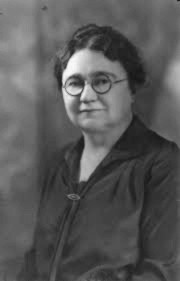One of the longest-serving pastors at Springfield, Clara Cox served here from 1918 to her death in 1940. She was the first woman pastor (though not the first female minister) at Springfield.
Her father was J. Elwood Cox, a prominent banker and business person in High Point who ran for governor in 1908. Her mother was Bertha Snow, the daughter of a former Union officer who came to High Point after the war and started a very successful business supplying spindles for the many textile mills in the area. She graduated from Guilford College in 1902, and went on to study at White’s Bible Institute and at Columbia University in New York City.

In addition to her work with Friends, Clara Cox was deeply interested in community and social concerns. During the terrible Spanish flu epidemic in 1918, she helped set up home nursing and a large temporary hospital. She helped to set up the first city nursing association, and arranged for the hiring of the first female police officers in the city.
Jim Crow laws were common throughout the South during her lifetime. Clara Cox was deeply committed to racial justice and equality. She chaired the Southern Women’s Committee for the Prevention of Lynching, at a time when lynching was at its peak. She made a survey of available housing for African-Americans for the City of High Point. She personally assisted with funds for education for African-American students. She organized many events to promote inter-racial understanding with entertainment by African-American gospel singers.
She was instrumental in organizing the local Welfare Department and the establishment of the City Library. One of the first public housing projects in High Point was named in her honor. She was extremely active in the YWCA and the WCTU.
Our present meetinghouse was built in 1926-27 during Clara Cox’s time as pastor. It replaced the 1858 meetinghouse which is now the Museum of Old Domestic Life, with its separate entrances for men and women. The new meetinghouse was bright, modern and airy, with central heat, indoor toilets, numerous Sunday School rooms, a spacious kitchen, and a large room for meetings, meals and fellowship.
Springfield grew dramatically in numbers during this time. She was an earnest, imaginative and inspiring preacher. Many new adult Sunday School classes were founded. Clara Cox served both during the “boom years” of the Roaring 20’s, when the furniture industry of High Point was growing rapidly, and also during the worst years of the Great Depression.
Clara Cox never married, and she lived at home with her parents for her entire life. Her hyper-busy life as a pastor left her with little time to manage her personal affairs. Her cousin Effie Cox came to live with her. A shy and quiet person, Effie took care of many of Clara’s personal needs.
An editorial the High Point Enterprise said, “She went about doing good. In prosperity and adversity this citizen was unchanged – a steady reliable source of help for those who needed help.”
Her memorial says, “The channels of service mentioned above are only a few that were publicly known. There is no record here of the service of love which was always uppermost in her life. Only her Master knew. She translated the inspiration of God which came to her into the commonplace scenes and needs of daily life. The majesty of God enthused her with a passion to make the whole of life beautiful with righteousness and peace. She had found that truth revealed in worship was applicable to commonplace life.”
